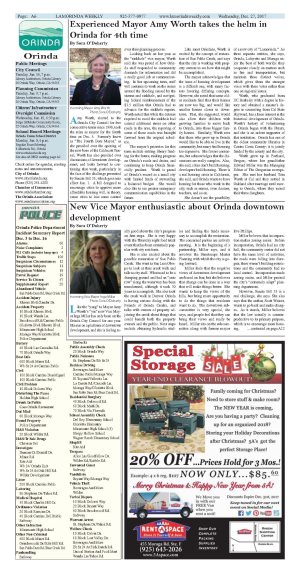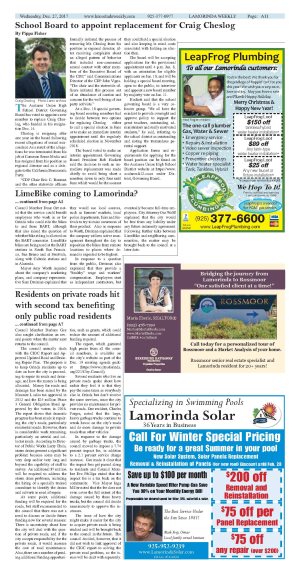| | Published December 27th, 2017
| Residents on private roads hit with second tax benefiting only public road residents
| | | By Sora O'Doherty | | |
Many residents who live on Orinda's private roads came to the Dec. 19 city council meeting to ask the council not to approve the Citizens Infrastructure Oversight Commission report until the council had resolved the issue of private roads. They succeeded to the extent that the council postponed approval of the report, but at the same meeting the council adopted an additional fee to be added to refuse collection bills that will go toward repairing the damage that garbage trucks do to public roads. Although all residents will pay the fee, which Council Member Dean Orr acknowledged is definitely a tax, and although all roads will be equally damaged by the large, heavy vehicles, only public roads will benefit.
 Some 23 percent of Orinda's roads are private. Vice Mayor Inga Miller asked that approval of the CIOC report, which was highly praised by the council and by Orr in particular, be postponed for a short while to allow the addition of some history of private roads in Orinda. Council Member Darlene Gee also sought clarification on several points when the matter next returns to the council.
Some 23 percent of Orinda's roads are private. Vice Mayor Inga Miller asked that approval of the CIOC report, which was highly praised by the council and by Orr in particular, be postponed for a short while to allow the addition of some history of private roads in Orinda. Council Member Darlene Gee also sought clarification on several points when the matter next returns to the council.
 The council annually deals with the CIOC Report and Approved Updated Road and Draining Repair Plan. The purpose is to keep Orinda residents up to date on how the city is proceeding to repair its roads and drainage, and how the money is being allocated. Money for roads and drainage has been raised by the Measure L sales tax approved in 2012 and the $25 million Phase 3 General Obligation Bond approved by the voters in 2016. The report shows that dramatic progress has been made in repairing the city's roads, particularly residential roads. However, there is considerable work remaining, particularly on arterial and collector roads. According to Director of Public Works Larry Theis, storm drains present a significant problem because some may be very deep and/or very long and beyond the capability of staff to survey. An additional $7 million will be required to address the storm drain problems, including the hiring of a specially trained consultant to identify the drains and culverts in need of repair.
The council annually deals with the CIOC Report and Approved Updated Road and Draining Repair Plan. The purpose is to keep Orinda residents up to date on how the city is proceeding to repair its roads and drainage, and how the money is being allocated. Money for roads and drainage has been raised by the Measure L sales tax approved in 2012 and the $25 million Phase 3 General Obligation Bond approved by the voters in 2016. The report shows that dramatic progress has been made in repairing the city's roads, particularly residential roads. However, there is considerable work remaining, particularly on arterial and collector roads. According to Director of Public Works Larry Theis, storm drains present a significant problem because some may be very deep and/or very long and beyond the capability of staff to survey. An additional $7 million will be required to address the storm drain problems, including the hiring of a specially trained consultant to identify the drains and culverts in need of repair.
 At some point, additional funding will be required for the roads, but staff recommended to the council that there was not a need to discuss or decide future funding now for several reasons: There is uncertainty about how the city will deal with the question of private roads, and if the city accepts responsibility for the private roads, it would increase the cost of road maintenance. Also, there are a number of pending additional funding opportunities, such as grants, which could reduce the amount of additional funding required.
At some point, additional funding will be required for the roads, but staff recommended to the council that there was not a need to discuss or decide future funding now for several reasons: There is uncertainty about how the city will deal with the question of private roads, and if the city accepts responsibility for the private roads, it would increase the cost of road maintenance. Also, there are a number of pending additional funding opportunities, such as grants, which could reduce the amount of additional funding required.
 The report, which garnered high praise from all the council members, is available on the city's website as part of the Dec. 19 meeting agenda packet (https://www.cityoforinda.org/221/City-Council).
The report, which garnered high praise from all the council members, is available on the city's website as part of the Dec. 19 meeting agenda packet (https://www.cityoforinda.org/221/City-Council).
 Several residents who live on private roads spoke about how unfair they feel it is that they pay the same taxes as everybody else in Orinda but don't receive the same services, since the city provides no maintenance for private roads. One resident, Charles Porges, noted that the large, heavy garbage trucks continue to wreak havoc on the city's roads and do more damage to private roads than other vehicles.
Several residents who live on private roads spoke about how unfair they feel it is that they pay the same taxes as everybody else in Orinda but don't receive the same services, since the city provides no maintenance for private roads. One resident, Charles Porges, noted that the large, heavy garbage trucks continue to wreak havoc on the city's roads and do more damage to private roads than other vehicles.
 In response to the damage caused by garbage trucks, the council moved to impose a 7.74 percent impact fee, in addition to a 2.1 percent service charge increase. Gee made it clear that the impact fees get passed along to residents and Council Member Eve Phillips stated that the impact fee is a tax back on the community. Vice Mayor Inga Miller noted that the fee does not even cover the full extent of the damage caused by these heavy trucks, but the council did decide unanimously to approve the increases.
In response to the damage caused by garbage trucks, the council moved to impose a 7.74 percent impact fee, in addition to a 2.1 percent service charge increase. Gee made it clear that the impact fees get passed along to residents and Council Member Eve Phillips stated that the impact fee is a tax back on the community. Vice Mayor Inga Miller noted that the fee does not even cover the full extent of the damage caused by these heavy trucks, but the council did decide unanimously to approve the increases.
 The issue of how the city might make it easier for the city to acquire private roads is being studied and will be brought back to the council in the future. The council decided, however, that it did not wish to link approval of the CIOC report to solving the private road problem, so the issues will be dealt with separately.
The issue of how the city might make it easier for the city to acquire private roads is being studied and will be brought back to the council in the future. The council decided, however, that it did not wish to link approval of the CIOC report to solving the private road problem, so the issues will be dealt with separately.


|
| | | | | | | | | | | | |



